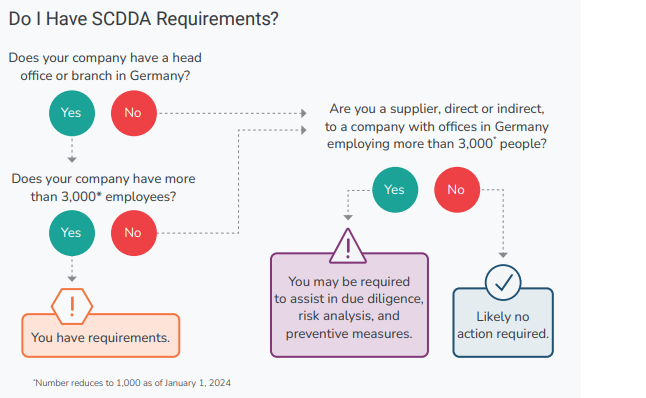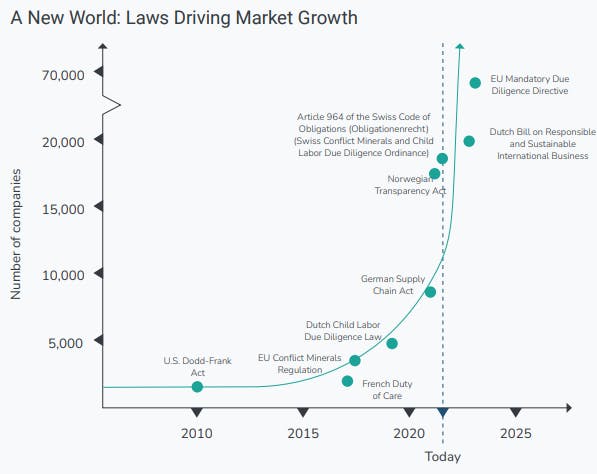As Osmii have been building out their ESG network, we have noticed ESG is the current topic at everyone's business due to higher consumer demands and the rapidly changing legal European landscape with ESG based business laws, such as SCDDA. Below we have outlined SCDDA and the future implications for businesses as we move towards an ESG conscious society and workforce.
Many European organisations will now have to rapidly transform their ESG practices for their survival.
In 2016, the German National Action Plan (NAP) of business and human rights set expectations of majority of mid-large German companies to perform effective human rights due diligence by 2020. In 2019, an assessment demonstrated only 17-19% of participating companies should support their compliance to the requirements; then declining more in 2020 with 13-17% companies complying. The reports proved to the German government the urgency of mandatory human rights due diligence legislation. As a result, Lieferkettensorgfaltspflichtengesetz (LkSG) became official German law in 2021. In English it is commonly referred to as German Supply Chain Due Diligence Act (SCDDA).
What is SCDDA?
From January 1st 2023, SCDDA will apply to companies:
- That employ more than 3,000 employees in Germany or via a German contract abroad
- Foreign companies with a branch office in Germany of similar size
Furthermore, from January 1st 2024, the law extends to companies with head offices or branches in Germany with 1,000 or more employees.

Companies may technically not meet the SCDDA scope and still face requirements as suppliers to in-scope corporations. This creates the corporate responsibility for in-scope companies to conduct risk analysis on their direct suppliers and implement preventative measures where appropriate around human rights and the environment. Facilitation abilities of these obligations will be key considerations in contract negotiations. Companies risk management systems will be measured against the UN Guiding Principles on Business and Human Rights:
- States have a duty to protect human rights, and laws and regulations should be used to prevent, investigate, punish, and rectify such abuse
- Businesses have a responsibility to respect human rights, and due diligence is the means through which they are expected to do this
- Affected people must have access to remedy
To cover the complexity of manufacturing supply chains, the legalisation includes stipulations to assess and report on:
- Forced labour
- Child labour
- Unsafe working conditions
- Negative community impacts e.g. land access and use of security forces
- Environmental harm related to the production and use of persistent organic pollutants
- The regulation defines two major protected legal positions: human rights and the environment
SCDDA defines nine high-level requirements:
1. Establish a risk management system- the goal of which is to:
a. Identify existing risks or areas where risks may originate
b. Prevent the realization of these risks and ensure all legal requirements are met
2. Define the party or parties responsible for compliance- in-house responsibility systems must keep company management informed of any developments and work to improve the system over time
3. Perform regular risk analysis- must be conducted annually with any identified risks must be appropriately weighted and prioritised and communicated internally to relevant decision-makers to take appropriate corrective action
4. Issue a policy statement inline with SCDDA goals- the policy must:
a. Outline the company-wide human rights strategy, including the human rights and environmental related risks identified
b. Describe the risk management strategy that’s been put in place
c. Communicate expectations regarding human rights to employees and the supply chain
5. Establish preventative measures within the company’s business unit and for direct suppliers- the first goal of SCDDA is always to prevent human rights violations from occurring in the first place. Organisations must implement training courses and control measures that address the varied requirements of the act
6. Take remedial action when risks are discovered- failure to do so runs risk of fines and significant civil action from impacted parties, NGOs or competitors
7. Establish complaints procedure- additionally companies must introduce contractual controls to their suppliers.
8. Implement due diligence with regard to risks posed by indirect suppliers- cross-sector initiatives such as the Responsible Minerals Initiative (RMI) help companies acquire meaningful data deep in the supply chain. This benefits companies by creating an increase of pressure on suppliers by establishing joint best practices and information sharing
9. Document and report on due diligence activities- provided annually by internal quality assurance, supply chain procurement teams or legal and direct suppliers. Companies can use widely used by industry templates such as Slavery and Trafficking Risk Template (STRT) to establish risk scores. Reports must be publicly available for seven years via a company’s website.
Consequences of non-compliance
1. Fines- Periodic or recurring penalty payments of up to €50,000. Fines can range up to €800,000 or two percent of average annual global turnover for companies earning over €400 million.
2. Exclusion from Public Tender- companies in violation of the SCDDA can be excluded from public contract competitions for up to three years, potentially costing millions in lost revenue.
3. Lawsuits- In certain situations, companies that have not performed due diligence activities or taken remedial action in response to violations will be open to lawsuits from affected persons, NGOs, and/or trade unions. The SCDDA, however, does not provide for or change existing civil liabilities with respect to damages incurred abroad.
The wider future
Mandatory human rights due diligence and reporting is rapidly becoming normalised in Europe. France, the Netherlands, Switzerland, Norway and others now require some form of due diligence from companies headquartered or operating in their nations.
When compliance is outsourced there is an inconsistency of what is covered and not; resulting in patchwork compliance solutions with poor integration, incongruences and an increased risk of error.

Osmii specialise in ESG recruitment and have a wide network of ESG profiles from start-ups to large companies such as Unilever.
For over 3 years, Osmii are proud to be working in collaboration with Workiva, ESG software (SaaS) reporting platform. A Forrester Wave leader, Workiva is also publicly listed (NYSE). Companies across the world use their platform to transform the way they report and manage ESG data, integrate their existing work streams into their reports and seamlessly enable collaboration. Osmii are very excited for their ESG event (Amplify) coming up soon in September with high profile attendants such as Coca Cola and Google as well as sponsors such as PwC.
With collaborations like these, Osmii are experienced and here to help your company with the dramatic shift towards sustainability and optimise your business performance to make the most of ESG developments.
Back to all posts